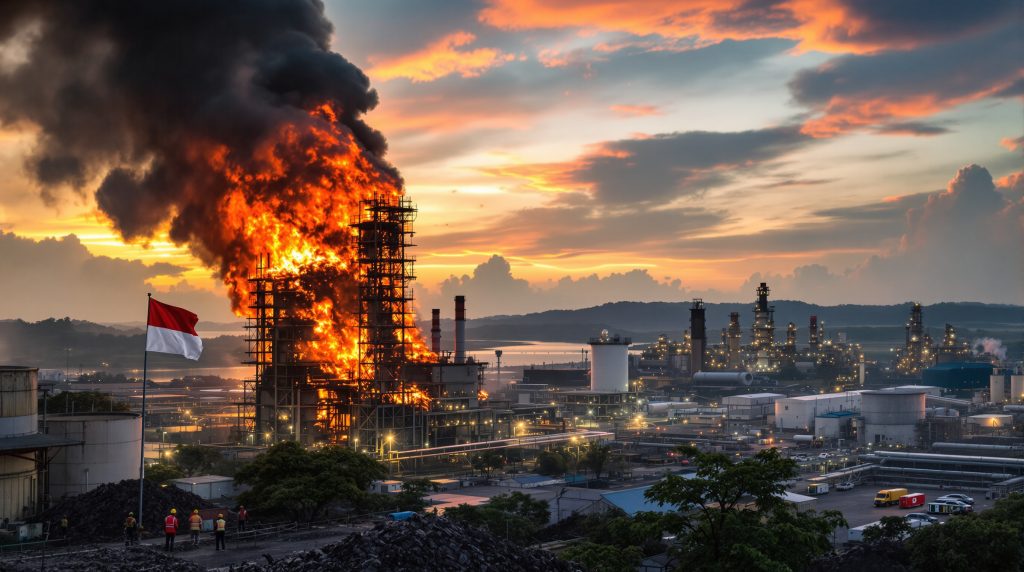Indonesia Nickel Hub Fire: Safety Concerns Rise After Latest Incident
A fire erupted on Sunday at Indonesia's largest nickel processing facility, the Morowali Industrial Park (IMIP), resulting in three workers sustaining minor injuries. The blaze affected a scrubber tower at one of the park's tenant facilities that was under construction. According to IMIP spokesperson Dedy Kurniawan, preliminary investigations suggest the fire may have originated from welding sparks, though a comprehensive investigation remains ongoing.
Despite the incident, operations across the broader industrial complex continued normally, as the fire was contained to a single area under construction. This localized impact allowed the majority of the facility to maintain production schedules.
How Does This Fire Fit into Indonesia's Nickel Industry Safety Record?
Recent History of Safety Incidents
The October 2025 fire at Indonesia nickel hub represents the latest in a concerning pattern of safety incidents plaguing Indonesia's rapidly expanding nickel sector. The country's nickel processing industry has experienced multiple serious accidents in recent years, highlighting persistent safety challenges within this strategically important industry.
In December 2023, a devastating fire and explosion at an IMIP nickel smelter resulted in approximately 19-21 fatalities, according to multiple international news sources including Reuters and Bloomberg. This incident prompted widespread concern about safety practices at Indonesia's processing facilities.
Earlier in 2025, reports indicated that a structural collapse affected another section of the industrial park, though the exact circumstances and casualty figures require further verification from official sources.
| Date | Incident Type | Facility | Casualties | Suspected Cause |
|---|---|---|---|---|
| October 2025 | Fire | IMIP (scrubber tower) | 3 injured | Suspected welding sparks |
| December 2023 | Major fire/explosion | IMIP smelter | Approximately 19-21 fatalities | Under investigation |
| Early 2025 | Structural incident | IMIP plant area | Multiple injuries reported | Under investigation |
These recurring incidents have drawn attention to potential safety deficiencies within Indonesia's rapidly expanding nickel processing sector, particularly at facilities constructed and operated under accelerated timelines to meet global demand.
Regulatory Response and Safety Standards
Following the deadly December 2023 fire, Indonesian authorities launched comprehensive investigations that pointed to potential safety protocol violations. Industry observers note that the government has repeatedly pledged to strengthen oversight of the sector.
Despite these commitments, safety advocates have raised concerns about:
- Inconsistent enforcement of existing safety regulations
- Production pressures potentially taking precedence over safety infrastructure
- Varying standards for worker training and protective equipment between facilities
- The need for enhanced emergency response capabilities, especially in remote areas
Environmental engineer Dr. Siti Nuraini from the Indonesian Mining Institute noted in a recent industry publication: "The rapid pace of facility construction often means safety systems are implemented unevenly. Without standardized inspections and enforcement, we continue to see preventable incidents."
Why Is Indonesia's Nickel Industry Growing So Rapidly?
Global EV Battery Supply Chain Significance
Indonesia has established itself as the dominant global nickel supplier through strategic policy decisions and natural resource advantages. According to the U.S. Geological Survey's 2024 Mineral Commodity Summary, Indonesia produced approximately 1.8 million metric tons of nickel in 2023, representing about 48% of global mine production.
This commanding position stems from several key factors:
- Indonesia possesses approximately 21 million metric tons of nickel reserves, among the world's largest deposits
- The country implemented a comprehensive ban on raw nickel ore exports in January 2020, forcing miners to build domestic processing facilities
- This policy has attracted massive foreign investment, particularly from Chinese companies seeking to secure battery material supply chains
- Integrated processing hubs like IMIP transform raw nickel ore into higher-value products including nickel pig iron, ferronickel, and increasingly, battery-grade materials
Economic Impact and Strategic Importance
The nickel sector represents a cornerstone of Indonesia's economic development strategy under President Prabowo Subianto's administration, which has continued policies established during former President Joko Widodo's tenure.
The Indonesian Ministry of Investment reports that nickel processing has become one of the country's largest export revenue generators, with processed nickel products bringing in billions of dollars annually. Government officials regularly cite the sector's contribution to employment creation, technology transfer, and industrial development.
Economic analyst Bambang Susantono from the Jakarta Economic Research Institute highlights: "Indonesia's transition from raw ore exporter to processor has dramatically increased the value captured domestically. A ton of processed nickel can generate 5-7 times the export revenue compared to raw ore exports."
What Are the Challenges Facing Indonesia's Nickel Industry?
Balancing Safety and Production Demands
The industry faces significant pressure to maintain production while addressing mounting safety concerns:
- Accelerated construction timelines often compress safety planning and implementation phases
- Skill gaps in the workforce as the industry expands faster than training programs can produce qualified personnel
- Complex technology integration requiring specialized expertise not always readily available
- Tropical climate challenges including heavy seasonal rainfall and high temperatures that affect equipment and operations
- Remote location logistics complicating emergency response, equipment maintenance, and regulatory oversight
Indonesian labor safety specialist Budi Santoso explained in a recent industry forum: "Many facilities operate in locations hours from major medical centers. This geographic reality makes robust on-site safety interview insights and emergency response capabilities absolutely essential."
Environmental and Social Considerations
Beyond safety incidents, the industry faces broader sustainability challenges that could affect its long-term viability:
- Deforestation concerns as processing facilities expand into previously forested areas
- Water usage and pollution from processing operations affecting local communities
- Energy consumption primarily from coal-powered smelters, contributing to carbon emissions
- Community displacement and changing local economic dynamics in previously agricultural regions
- Labor practices and working conditions varying widely between operators and facilities
Environmental researchers have documented increasing pressure on local ecosystems, with satellite imagery showing significant land use changes in nickel-producing regions of Sulawesi and other islands.
How Could This Impact Global Nickel Markets?
Supply Chain Implications
While this particular fire appears contained with minimal production impact, recurring safety events raise questions about Indonesia's nickel industry reliability:
- Short-term market impact: Minimal from this specific incident, as operations continued normally according to IMIP spokesperson Dedy Kurniawan
- Medium-term considerations: Potential for increased regulatory oversight that could temporarily slow expansion plans
- Long-term outlook: Possible acceleration of alternative nickel sourcing strategies by battery manufacturers and automakers concerned about supply chain resilience
Battery materials analyst Leah Chen from Battery Materials Review notes: "While individual incidents may not disrupt overall supply, the pattern creates a risk premium for Indonesian nickel. This potentially accelerates interest in projects from Australia, Canada and other jurisdictions perceived as having more stable operating environments."
Price Sensitivity to Indonesian Production
Global nickel markets remain highly sensitive to Indonesian production disruptions due to the country's dominant market position:
- Even minor production interruptions can trigger price volatility in an already tight market
- Safety incidents increase risk premiums in futures markets as traders price in potential disruptions
- Insurance costs for Indonesian operations may rise with recurring incidents, potentially affecting operating economics
- Alternative suppliers currently lack sufficient capacity to quickly replace Indonesian volumes if major disruptions occur
Commodity markets typically respond quickly to Indonesian nickel news, with prices often exhibiting volatility following reports of production issues or policy changes affecting the sector.
What Safety Improvements Are Needed in Indonesia's Nickel Industry?
Technical and Operational Enhancements
Industry experts suggest several critical improvements to address recurring safety challenges:
- Standardized safety protocols implemented consistently across all processing facilities
- Enhanced fire prevention systems particularly in high-risk areas such as smelting operations
- Regular third-party safety audits with published findings and remediation requirements
- Comprehensive worker training programs with certification requirements for specialized roles
- Upgraded emergency response infrastructure including on-site medical facilities and evacuation protocols
Safety technology specialist Dr. Hiroshi Tanaka from the International Mining Safety Association recommends: "Processing facilities should implement continuous monitoring systems that can detect abnormal conditions before they escalate to dangerous situations. These systems exist in other industries but remain underutilized in many Indonesian operations."
Regulatory Framework Development
The Indonesian government faces mounting pressure to strengthen oversight through:
- Creating a specialized nickel industry safety regulatory body with technical expertise
- Implementing mandatory safety performance reporting with transparent metrics
- Establishing clear penalties for safety violations that scale with severity
- Requiring transparent incident investigations with public findings and corrective action plans
- Developing industry-specific safety standards reflecting the unique challenges of nickel processing
Mining governance expert Dr. Patricia Rodriguez suggests: "Effective regulation requires both technical standards and enforcement capacity. Indonesia needs to invest in building a robust regulatory framework that can keep pace with the industry's rapid expansion."
What Does This Mean for Indonesia's Position in the Global Nickel Market?
Competitive Landscape Assessment
Despite safety challenges, Indonesia maintains significant competitive advantages in global nickel markets:
- Resource abundance: Unmatched nickel ore reserves providing long-term supply security
- Integrated processing: Growing capacity across the value chain from mining to refined products
- Government support: Strong policy backing for industry development and expansion
- Infrastructure investment: Dedicated industrial parks with power generation and logistics capabilities
- Cost advantages: Lower production costs compared to many alternative jurisdictions
These structural advantages help explain why investment continues to flow into the sector despite operational challenges and safety concerns. Furthermore, industry evolution trends indicate that technological advancements may help address some of these safety issues in the coming years.
Future Development Trajectory
The industry's continued evolution will likely include:
- Greater emphasis on safety systems in new facility designs and retrofits
- Increased automation to reduce human exposure to hazardous conditions
- More diverse ownership as Indonesia seeks to balance Chinese dominance with other international partners
- Enhanced environmental controls as global sustainability standards rise
- Development of downstream manufacturing to capture more value through battery component and electric vehicle production
Indonesian officials have repeatedly emphasized their intention to move up the value chain, with the Ministry of Industry announcing targets to establish domestic battery manufacturing and eventually electric vehicle production. Additionally, the implementation of modern mine planning techniques may further improve safety outcomes.
FAQs About Indonesia's Nickel Industry Safety
How does Indonesia's nickel safety record compare to other major producers?
Indonesia's nickel industry has experienced more high-profile safety incidents than established nickel producers like Canada and Australia in recent years. However, direct comparisons are complicated by differences in reporting requirements, facility age, and processing technologies.
The rapid expansion of Indonesia's industry has created unique safety challenges not typically seen in more mature mining jurisdictions with longer-established regulatory frameworks and operational practices.
What role do foreign investors play in safety standards?
Foreign investors, particularly Chinese companies, have brought significant capital and technical expertise to Indonesia's nickel industry. However, safety cultures and standards vary widely between operators.
Some facilities maintain world-class safety systems comparable to international best practices, while others have faced criticism for prioritizing rapid development over comprehensive safety infrastructure.
Indonesian mining expert Dr. Bambang Sulistiyono observes: "The variability in safety performance often reflects the standards of the parent company and home country regulations. Operations run by companies with strong global safety cultures tend to perform better regardless of local regulatory enforcement."
How might recurring safety incidents affect Indonesia's nickel strategy?
While individual incidents have not significantly altered Indonesia's nickel development strategy, the cumulative impact of safety concerns could prompt regulatory changes.
The government continues to balance aggressive industry growth targets with increasing pressure to ensure worker safety and environmental protection. Recent statements from the Ministry of Energy and Mineral Resources suggest a growing recognition that long-term industry sustainability requires addressing these concerns.
What alternatives exist to Indonesian nickel for battery manufacturers?
Battery manufacturers seeking alternatives to Indonesian nickel face limited options in the near term:
- Australia, Canada, and Russia offer high-quality nickel but at higher production costs
- Recycling provides a growing but still limited secondary supply source
- Alternative battery chemistries like lithium iron phosphate (LFP) can reduce nickel dependence but often with energy density tradeoffs
- Synthetic nickel production technologies remain in early development stages with uncertain commercial viability
Mining analyst James Wilson notes: "For high-energy density batteries, nickel remains essential, and Indonesia's dominant position means manufacturers can reduce but not eliminate their dependence on Indonesian supply in the foreseeable future." Companies like those developing the Tamarack Nickel-Copper Project in North America may eventually provide alternative sources, but capacity remains limited compared to Indonesian production.
Balancing Growth and Safety in Indonesia's Strategic Industry
The October 2025 fire at Indonesia nickel hub highlights the ongoing tension between rapid industrial development and safety considerations in this strategically important sector. While this particular incident resulted in only minor injuries, it serves as another reminder of the challenges facing the world's largest nickel producer.
As global demand for nickel continues to grow, driven largely by electric vehicle battery production, Indonesia's ability to address safety concerns while maintaining its dominant market position will be crucial. The industry's evolution will require balancing production pressures with enhanced safety systems, regulatory oversight, and sustainable practices.
For global markets, Indonesian nickel production remains irreplaceable in the near term, making the industry's safety performance a matter of international significance. How Indonesia navigates these challenges will shape not only its economic development but also the global transition to electric mobility. The integration of AI in mining operations may provide new tools for enhancing safety and efficiency.
The path forward likely involves significant investment in safety infrastructure, technical training, and regulatory capacity building to ensure that Indonesia's nickel industry can sustain its growth while protecting workers and communities.
Disclaimer: This article contains analysis and forecasts regarding market conditions and industry developments. These represent current assessments based on available information and should not be considered investment advice. Market conditions can change rapidly, and actual outcomes may differ from those discussed.
Want to Stay Ahead of Major Mineral Discoveries?
Discovery Alert's proprietary Discovery IQ model analyses ASX announcements in real-time, providing instant notifications when significant mineral discoveries are announced. Explore how historic discoveries have generated substantial returns by visiting the dedicated discoveries page.




